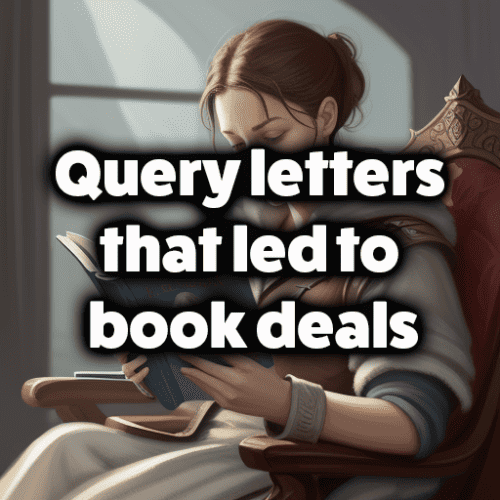Query letters that led to book deals
Query letters that led to book deals. Are you an author navigating the thrilling but tumultuous journey to publication? If so, you’re probably well-acquainted with the art of writing a query letter. This crucial one-page letter, sent to literary agents, acts as your golden ticket to the publishing world. But what makes a query letter transformative? How can it catapult an unassuming manuscript into a thrilling book deal?
In this comprehensive guide, we unravel the magic behind successful query letters. We’ll explore the secret ingredients, common missteps, and even real-life success stories. Also, we’ll dive into how EditMojo.com, a platform dedicated to refining authors’ voices, plays a significant role in this process.
Key Takeaways
| Key Point | Takeaway |
|---|---|
| The Importance of a Query Letter | A well-crafted query letter is essential to securing a book deal as it provides the first impression of your work to literary agents. |
| Anatomy of a Successful Query Letter | An effective query letter consists of three parts: the Hook, the Synopsis, and the Author Bio. Each component plays a significant role in capturing the attention and interest of literary agents. |
| Successful Query Letters and Book Deals | Query letters for renowned novels like “The Help”, “The Hunger Games”, and “Harry Potter and the Philosopher’s Stone” effectively piqued the interest of agents, leading to successful book deals. |
| Common Mistakes in Query Letters | Failing to personalize the query letter and overcomplicating the pitch are common mistakes. It’s crucial to avoid these to enhance the chances of securing a book deal. |
| Role of EditMojo.com | EditMojo.com provides professional assistance to authors in crafting effective query letters. Their expertise has helped numerous authors secure book deals. |
The Anatomy of a Successful Query Letter
To truly understand the intricacies of a query letter, we must first dissect its anatomy. A compelling query letter comprises three fundamental components:

The Hook
Think of your favorite book. Now, imagine you had to capture its essence in just one or two sentences. A bit challenging, right? This is essentially what a hook is: a tantalizing taste of your story that compels the reader to want more.
The Synopsis
After you’ve baited the reader with your hook, it’s time to reel them in with your synopsis. Here, you outline your story, giving a glimpse into your characters, plot, and the unique world you’ve created. It’s about striking the right balance – enough to spark curiosity but not too much to spoil the surprises.
The Author Bio
This is your chance to introduce yourself as a writer. Remember, agents want to work with people, not manuscripts, so your bio should be professional, intriguing, and genuine.

Notable Success Stories: Query Letters That Secured Book Deals
Nothing illuminates the path to success like real-life examples. Here are a few query letters that have shaped the literary world as we know it today.
The Help by Kathryn Stockett
Stockett’s journey was far from easy. She faced 60 rejections before her novel found a home. Her query letter was striking, capturing the heart of her story and the social issues it addressed.
The Hunger Games by Suzanne Collins Collins’ query letter presented a unique dystopian world that caught the attention of Scholastic. It perfectly encapsulated the dark, compelling nature of the series, resulting in an unforgettable book deal.
Harry Potter and the Philosopher’s Stone by J.K. Rowling
Rowling’s query letter made literary history, conjuring a world of magic that convinced Bloomsbury to take a chance on a then-unknown writer.
Common Mistakes and How to Avoid Them
Unfortunately, the path to a book deal is strewn with pitfalls. Here are some of the most common mistakes authors make when drafting their query letters.
Not Personalizing Your Letter
Researching agents and personalizing your letter is crucial. Agents can tell when they receive a generic, one-size-fits-all letter. Make sure you tailor your query to each agent you’re submitting to.
Overcomplicating Your Pitch
The purpose of your query letter is to make an agent want to read your manuscript. If your pitch is confusing or overly complex, it’s likely to have the opposite effect.

The Role of EditMojo.com in Crafting Successful Query Letters
This is where EditMojo.com comes into play. With a team of seasoned editors and writers, they provide expert guidance to authors seeking to perfect their query letters. Their success stories speak volumes, with many authors landing book deals after working with them.
Tips and Techniques for Writing a Query Letter That Stands Out
Crafting a query letter can feel like trying to bottle lightning – elusive and unpredictable. However, with the right techniques, you can capture that spark.
Research Your Agents
Know your agents’ likes, dislikes, and their list of represented authors. This can help you craft a query letter that will resonate with them.
Proofread and Revise
Ruthlessly edit your query letter. Ensure it is free of grammatical errors and that it communicates your story effectively. After all, this is your first impression, make it count!
The journey to a book deal begins with a single step—or, in this case, a single letter. Remember, even the most celebrated authors faced rejections. So, keep refining, keep submitting, and most importantly, keep writing. And with EditMojo.com by your side, you’re equipped with a powerful ally in this literary adventure.
Sample Query Letters That Led to Book Deals
For more inspiration, check out these actual query letters that have led to successful book deals. They’re proof that the magic of a well-crafted query letter can indeed lead to real, tangible success.
References
- Successful Queries
- EditMojo.com
- The Help Query Letter
- The Hunger Games Book Deal
- Harry Potter and the Philosopher’s Stone Book Deal
Top Five Questions and Answers
| Question | Answer |
|---|---|
| What is the purpose of a query letter? | A query letter is used to pique the interest of literary agents. It serves as an introduction to your manuscript, providing a snapshot of the plot, characters, and your credentials as a writer. |
| What makes a successful query letter? | A successful query letter captures the essence of the story in a concise manner, introduces the author, and is personalized to the agent. It should be engaging and professional, sparking the agent’s interest in the manuscript. |
| Can a query letter lead to a book deal? | Yes, a well-crafted query letter can lead to a book deal. It serves as the first step in the process of securing a publishing contract. |
| What are common mistakes in writing query letters? | Common mistakes include failing to personalize the letter for each agent, making the pitch overly complex or confusing, and including irrelevant information in the author bio. |
| How can EditMojo.com assist with query letters? | EditMojo.com can provide expert advice on crafting compelling query letters. Their team of experienced editors and writers can help refine the letter to maximize the chances of securing a book deal. |
Top Ten Resources and Further Reading
| Resource | Description |
|---|---|
| 1. EditMojo.com | An excellent resource for refining your query letter and manuscript with expert help. |
| 2. Successful Queries – Writer’s Digest | A collection of successful query letters that secured book deals. |
| 3. Query Shark | An informative blog where real query letters are critiqued for learning purposes. |
| 4. AgentQuery | A resource for finding literary agents and crafting query letters. |
| 5. Jane Friedman on Query Letters | A veteran in the industry provides her insights on crafting compelling query letters. |
| 6. How to Write a Query Letter – The Writer’s Workshop | A guide to writing an effective query letter. |
| 7. BookEnds Literary Agency | A literary agency’s guide to what they look for in query letters. |
| 8. Poets & Writers – Literary Agents Database | A database of literary agents to consider for your submission. |
| 9. Publishers Weekly | An industry standard for news about book deals, with insights into what publishers are looking for. |
| 10. MasterClass on Query Letters | A comprehensive guide to query letters by MasterClass. |
Fun Interactive Quiz: Do You Know Your Query Letters?
- What is the purpose of a query letter?
- A. To secure a book deal
- B. To introduce your manuscript to literary agents
- C. To present your author bio
2. Which of these is NOT a component of a successful query letter?
- A. The Synopsis
- B. The Hook
- C. A detailed summary of each chapter
3. What is the role of the Hook in a query letter?
- A. To introduce the author
- B. To provide a detailed summary of the plot
- C. To grab the reader’s attention and spark curiosity
4. Which book’s query letter faced 60 rejections before securing a deal?
- A. The Hunger Games
- B. Harry Potter and the Philosopher’s Stone
- C. The Help
5. What is a common mistake when writing a query letter?
- A. Overcomplicating the pitch
- B. Personalizing the letter for each agent
- C. Keeping the letter concise and engaging
Answers:
- B. To introduce your manuscript to literary agents
- C. A detailed summary of each chapter
- C. To grab the reader’s attention and spark curiosity
- C. The Help
- A. Overcomplicating the pitch
